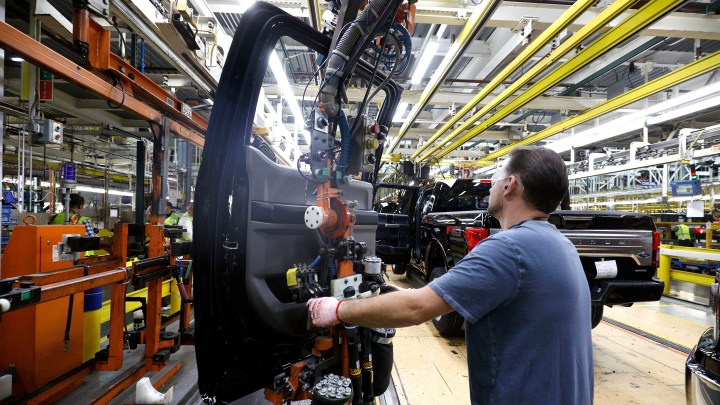
The chip shortage is idling Ford plants – and Ford autoworkers
The chip shortage is idling Ford plants – and Ford autoworkers

Ford is temporarily stopping or slowing production at a number of its factories, including plants that make its most popular truck, the F-150.
That’s because of the semiconductor chip shortage we’ve been talking about lately. The average wait time for chips right now, according to a report from the Susquehanna Financial Group, is 18 weeks.
What does this mean for the people who actually make the cars?
The U.S. auto industry goes through a lot of ups and downs. “It’s very cyclical, and it’s subject to things like supply-chain issues,” said Michelle Krebs at Cox Automotive, who added that “unfortunately, autoworkers are rather used to this roller-coaster ride of having jobs and then being laid off.”
People who work at Ford, General Motors and Stellantis (formerly Chrysler) are pretty well-protected from that unpredictability because they’re unionized.
Kristin Dziczek, at the Center for Automotive Research, points to a provision in United Auto Workers contracts saying that if your plant is idled, your employer “will make up the difference between the unemployment that you get from the state and a large share of what you would have earned had you been working.”
And, often, the layoffs are temporary. Andy Challenger, at the outplacement firm Challenger, Gray & Christmas, said that’s the case now. And the automakers are making sure their employees know it.
“Because there is an overall labor shortage occurring right now, too. So there probably is some concern from these manufacturers that those people will go out and find new jobs in the interim if they keep them on furlough for too long,” he said.
Closing plants that produce the F-150 for very long would be a big deal for another reason, said Dziczek at the Center for Automotive Research.
“It’s a really big deal to shut down pickup-truck plants. Shutting down pickup-truck production means shutting down profits,” she said.
And that could affect employees as well because they get profit-sharing checks.
“They’ve been enormous — 8, 10, $12,000 a year — for a number of years now. That’ll be a hit to personal income for workers who get profit-sharing,” Dziczek said, adding that the hit would extend to local economies, where those checks are spent.
There’s a lot happening in the world. Through it all, Marketplace is here for you.
You rely on Marketplace to break down the world’s events and tell you how it affects you in a fact-based, approachable way. We rely on your financial support to keep making that possible.
Your donation today powers the independent journalism that you rely on. For just $5/month, you can help sustain Marketplace so we can keep reporting on the things that matter to you.











